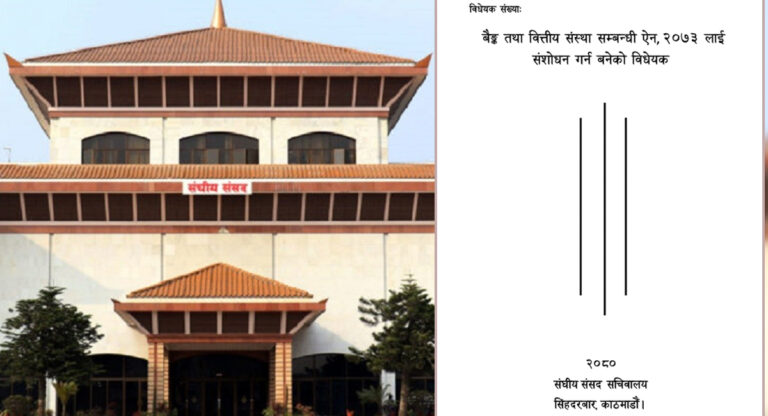KATHMANDU: The Banks and Financial Institutions Act (BAFIA) is an important legal framework regulating Nepal’s financial institutions.
It has long served as a guide for how banks and financial entities operate, helping to shape the nation’s financial landscape. With deposits surpassing Rs 6.6 trillion, the proposed amendment to this Act has sparked widespread debate among bankers, business owners, policymakers, and lawmakers.
To understand why this amendment has become such a focal point, it’s important to explore what BAFIA is, its evolution, and the motivations behind the changes.
BAFIA was first introduced in 2006 as a unifying legal framework that replaced several older acts, such as the Agricultural Development Bank Act, 1967 and the Commercial Bank Act, 1974. This merger aimed to bring clarity and uniformity to Nepal’s banking regulations.
BAFIA outlined comprehensive rules for the establishment, governance, and regulation of banks and financial institutions. It also specified measures to address banking offenses and ensure accountability.
Since then, BAFIA has been updated periodically, with the last amendment being made in 2017. The government now aims to revise the law again to keep pace with changing financial realities.
The need for amendment arises from Nepal’s evolving financial environment and the increasing complexity of the global banking system.
The government has said the proposed changes are necessary to address financial risks, enhance regulatory oversight, and incorporate new technological advancements such as digital currencies. Additionally, the amendment seeks to systematically implement the financial jurisdiction of federal, provincial, and local governments, as outlined in Nepal’s Constitution.
One of the most debated aspects of the amendment is the effort to separate banking and business interests.
The proposal in the bill bars banks from lending to individuals or entities that have significant ownership stakes in the institution. This measure aims to address conflicts of interest and promote good governance.
Critics, however, argue that this restriction could limit the private sector’s role in banking development. Business owners with stakes in banks argue that regulatory bodies like Nepal Rastra Bank, rather than legislation, should address such issues.
Another key proposal in the bill involves raising governance standards.
The amendment aims to set stricter eligibility criteria for bank directors, including a minimum qualification of a bachelor’s degree. It also specifies that individuals under 25 or over 70 years of age cannot serve as directors and requires women’s inclusion on bank boards.
Provisions to license digital banks and regulate digital currencies have also been included, reflecting Nepal’s growing interest in modern financial instruments.
The private sector has expressed significant concerns about the amendment. Business communities argue that the proposal to prevent entrepreneurs from holding positions in banking institutions could stifle innovation and reduce investment incentives.

Some lawmakers have even proposed extreme measures in the bill, such as limiting bank ownership to state entities, further fueling apprehension within the private sector.
The legislative process for the amendment is currently underway.
The bill has been sent to the Finance Committee of the House of Representatives for detailed discussion. Once approved by both the House and the National Assembly, it will require presidential authentication before becoming law.
The government argues the proposed amendments to BAFIA aim to modernize Nepal’s financial regulatory framework and align it with global best practices. However, balancing the need for stricter regulation with the interests of the private sector remains a challenging task.
The decisions made in this process will not only impact the financial institutions governed by the Act but also influence broader economic growth and development in Nepal.
As the debate continues, it underscores the importance of collaboration and dialogue among lawmakers, regulators, and stakeholders to ensure that the changes are both effective and equitable.









Comment